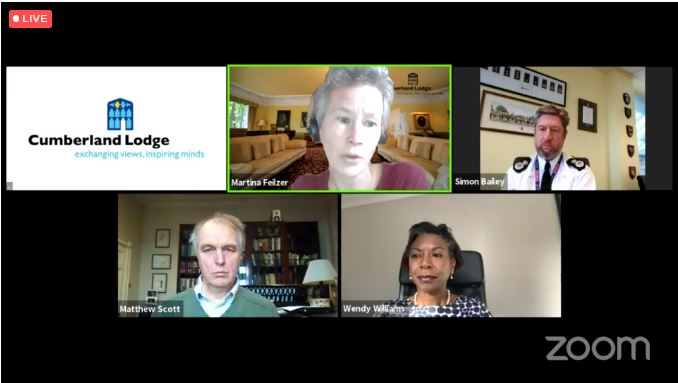On Wednesday 27 January, Cumberland Lodge hosted the first of three public webinars in the lead-up to the 2021 Cumberland Lodge Police Conference, ‘Towards Justice: Law Enforcement & Reconciliation’, taking place in June 2021.
This opening webinar, ‘Responding to Past Harms’, examined of how we should address past injustices and historical wrongs in society from a policing and criminal justice perspective.
The discussion was chaired by Martina Feilzer, the freelance Research Associate who has been commissioned to support our Towards Justice project and a Professor of Criminology and Criminal Justice at Bangor University. We were joined by guest panellists:
- CC Simon Bailey QPM – Chief Constable of the Norfolk Constabulary
- Wendy Williams CBE – Author of the Windrush Lessons Learned Review, 2020
- Matthew Scott – Criminal Barrister at Pump Court Chambers
It is beyond the scope of this short reflective piece to address the complexity of the debates surrounding with the way we address past harms as diverse as those laid out by Matthew Scott, at the outset of the webinar. From non-recent sexual offences, war crimes, miscarriages of justices, and incidents that were not considered crimes at the time but are very much considered criminal now, the range of past harms, in general, is vast and will be delved into more deeply over the series of upcoming events in the Towards Justice series that Cumberland Lodge is hosting this year (see here for details and registration links).
The role of the police?
One point really stuck with me, throughout the discussion, and it lies at the heart of how we, as a society, view the police and justice more broadly. Much of the debate revolved around the question of whether the policing of non-recent crimes should start from the position of believing someone who presents as a victim, particularly involving allegations of sexual assault, and the role that may have on investigative impartiality.
Chief Constable Simon Bailey advocated for a victim and/or survivor-centred approach, which ensures that people coming forward to make a disclosure feel believed by the police when they make their initial complaint. He strongly believes that it is important for the police to work with victims and survivors, to help bring some acknowledgement and resolution to their abuse.
Agreeing with Simon’s acknowledgement that ‘past harms are often continuing harms’, Matthew Scott was nevertheless troubled by the potential for the police to act as ‘agents of the complainant’, citing high-profile cases where false allegations have been made, resulting in both harm and reputational damage to the individuals who were falsely accused, but also affecting the reputation of the police service in general. (See here for details of a 2018 College of Policing paper on the recommendations of the Review into the Terminology “Victim/Complainant” and Believing Victims at time of Reporting).
Rather than starting from the starting-point of believing the testimonies of people who come forward with allegations, and then carrying out an impartial investigation, Matthew advocates an approach whereby complaints are heard and investigated by the police without any pre-conception of what they might find.
Simon responded by stressing that believing the victim isn’t just about believing the victim; it is part of a wider process of addressing past harms that may have been perpetrated by the police, as evidenced in an interrogation of a rape victim by Thames Valley police that was filmed in 1982. Just as large-scale inquiries serve to reassure people that future generations will not have to suffer a repeat of past harms or injustices. Reassuring people who come forward to report harm or abuse that the police will believe them is a necessary part of the process of reaching some form of resolution for all involved.
Drawing connections with the Windrush Lessons Learned Review, Wendy Williams observed that acknowledging ‘profound institutional failure[s]’ is integral to reparative action, but that it is not enough on its own. Wendy called for ‘acceptance’ and ‘a commitment to change’ but stressed that efforts mustn’t end there. She said, ‘There has to be ongoing monitoring, scrutiny, oversight, to make sure that we remain vigilant and that these past harms can’t become future or indeed present harms’.
The question of belief, which Matthew and Simon debated, is highly relevant to the work that Wendy carried out in relation to the Windrush review, as many of the people who were disadvantaged by the so-called ‘hostile environment’ around the Windrush scandal lacked documentary evidence to support their claims to residency through no fault of their own.
Stressing the importance of context, Matthew noted that the consequences of taking a belief-centred approach are vastly different in cases of people who have lived in this country for decades, as opposed to the case of someone who might be convicted of historic child sex offences with a very low standard of proof.
Policing the past, policing the future
This webinar left me reflecting on what we want the future of policing to be, in the UK. We are witnessing ever-increasing scrutiny of the police – from the Stephen Lawrence Inquiry, which highlighted institutional racism; to the Hillsborough Inquiry and subsequent inquest and report, which revealed operational failings and deflection of blame.
In the light of more recent events, the Black Lives Matter movement has made more radical calls to redistribute funds from the police to the civil society organisations, on both sides of the Atlantic, under the ‘defund the police’ banner.
I was struck by the variety of possibilities of a victim-centred police force. Reflecting on policing and criminal justice responses to past harms clearly provides great potential for thinking more broadly about the future role of the police.


